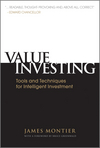THE LITTLE BOOK OF BEHAVIORAL INVESTING
 Value Investing: Tools and Techniques for Intelligent InvestmentISBN: 978-0-470-68359-0
Hardcover
416 pages
December 2009
This is a Print-on-Demand title. It will be printed specifically to fill your order. Please allow an additional 15-20 days delivery time. The book is not returnable.
Learn more about this book
|
|||||||
THE LITTLE BOOK OF BEHAVIORAL INVESTING
THE LITTLE BOOK
OF
BEHAVIORAL INVESTING
How Not to Be Your Own Worst Enemy
by
James Montier
James Montier’s THE LITTLE BOOK OF BEHAVIORAL INVESTING: How Not to Be Your Own Worst Enemy (Wiley; February 2010; $19.95; Hardcover) gives readers a guided tour of the most common behavioral challenges and psychological pitfalls investors encounter and provides straightforward strategies to eliminate these traits that time and again have proven to be the downfall of the vast majority of investors.
The latest advances in behavioral psychology tell us that humans are prone to make decisions emotionally rather than rationally. More often than not, fear and desire trump IQ when it comes to investing. Yet emotional self-control is more important than education. As Warren Buffett has pointed out, “Success in investing doesn’t correlate with ordinary intelligence, what you need is the temperament to control the urges that get other people into trouble in investing.” Indeed, Benjamin Graham, the father of value investing, said that “the investor’s chief problem—and even his worst enemy—is likely to be himself.”
THE LITTLE BOOK OF BEHAVIORAL INVESTING will teach readers how to recognize and avoid the mental pitfalls most investors make while exploring the underlying psychology behind these mistakes. Better still, James Montier will show you what you can do to try to protect your portfolio from their damaging influence on your returns. Among the many topics THE LITTLE BOOK OF BEHAVIORAL INVESTING examines include:
- The Importance of Pre-Commitment. Smart investors never invest in the heat of the moment. Nor do they procrastinate until the last minute. Discover a sure-fire secret Sir John Templeton used to take his emotions out of his investing.
- The Dangers of Overconfidence. The tendency to overrate our abilities is matched only by the illusion to think we can determine the outcome of events. Learn what Benjamin Graham and Warren Buffet have to say about the perils of self-serving optimism—and what you can do to defend yourself against it.
- Stop Listening to the Experts! The shocking truth is that, when it comes to portfolio success, the majority of so-called experts of investing fare no better and often worse than the man or woman in the street. Discover the real reason why people listen to Jim Cramer—and why you never want to make this fatal mistake.
- The Folly of Forecasting. Those who have knowledge don’t predict. Those who predict don’t have knowledge. Yet most of the investment industry obsesses with trying to guess the future. Don’t predict, says Montier. Instead, be prepared.
- Information Overload. When it comes to investing, we seem to be addicted to knowledge. More is better when it comes to information, right? Not so. Too much information, argues Montier, is just as bad as too little. Learn how to focus on what really matters in investing rather than the mountains of data Wall Street spews daily.
- The Siren Songs of Wall Street. Of all the dangers that investors face, none is more seductive than the stories Wall Street spins in order to lure investors and part them from their money. THE LITTLE BOOK OF BEHAVIORAL INVESTING shows readers how to immunize themselves against these tall tales by knowing instead how to focus on cold, hard facts.
- Your Edge over the Pros. Believe it or not, the ordinary investor has one huge edge over professional investors and James Montier shows how to exploit that edge to produce superior returns.
The key lesson that the world’s greatest investors have learned is that you must concentrate on the process of investing. Process is the set of rules that govern how we go about investing. Successful investors do so by integrating safeguards that protect them from mindless investing. The reason that they have codified the process is that they know that unless they force themselves to behave in this fashion, they will slip back into their old bad habits. James Montier’s THE LITTLE BOOK OF BEHAVIORAL INVESTING will teach readers to think more carefully about the way they invest and that is the first step in overcoming your own worst enemy when it comes to investment—yourself!
About the Author
James Montier is a member of the asset allocation team at GMO, London. He has been the top rated strategist in the annual Thomson Extel survey for the last five years. He was on the 50 must-read analysts list complied by the Business magazine and has been described as a Maverick by the Sunday Times, an enfant terrible by the FAZ, the Dean of behavioural finance by the FT and a prophet by the Fast Company. Montier is the author of three market leading books: Behavioural Finance: Insights into Irrational Minds, and Behavioural Investing, A Practitioners Guide to Applying Behavioural Finance, Value Investing: Tools and Techniques for Intelligent Investment and was one of 12 investors featured in John Mauldin’s Just One Thing: Twelve of the World's Best Investors Reveal the One Strategy You Can't Overlook (Wiley 2005; 9780471738732). He is widely regarded as the leading authority on behavioural finance and his investments and analysis are regularly quoted in investment media including The Technical Analyst, Value Investing World, Micromotives, Turtletrader.com, greenlightinvestor.com, FTAdvisor, RGE Monitor, Investor Insight.com, Trade2win.com, and many more.
The Little Book of Behavioral Investing:
How not to be your own worst enemy
By James Montier
Hardcover; February 2010; 978-0-470-68602-7; $19.95
James Montier’s recent book -
VALUE INVESTING:
Tools and Techniques for Intelligent Investment
ISBN: 978-0-470-68359-0
Is now available in the United States




